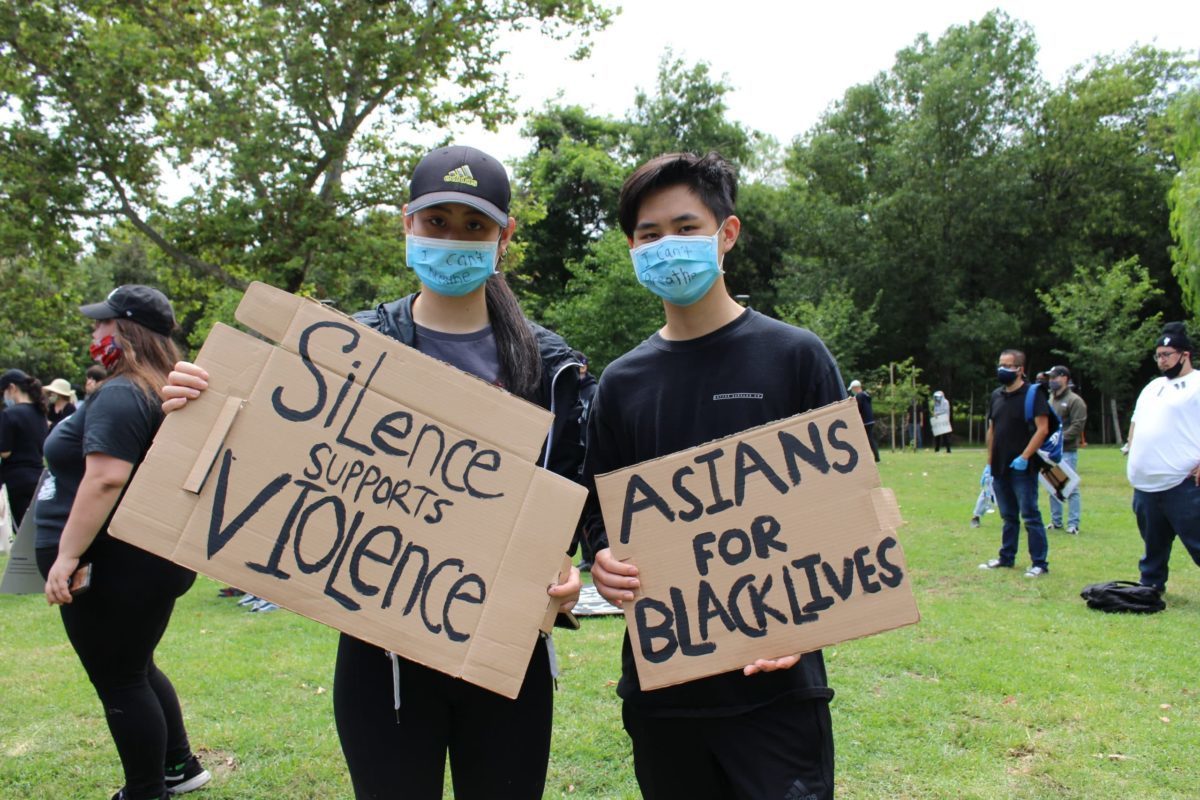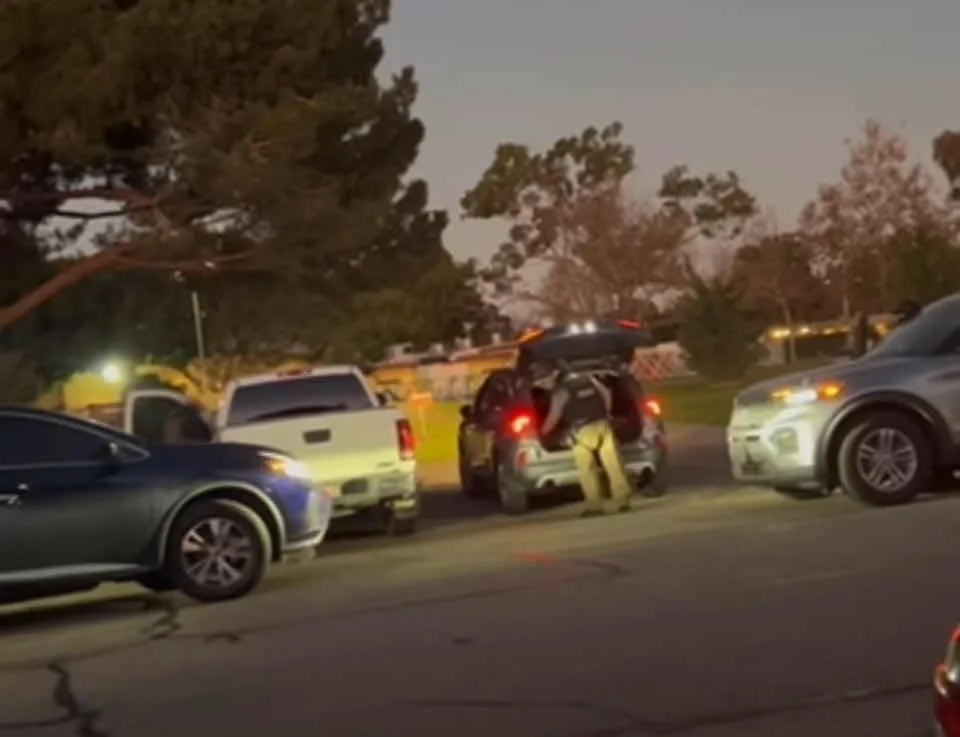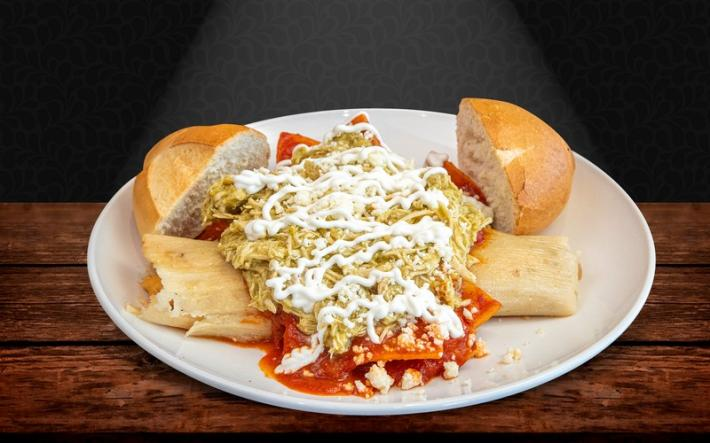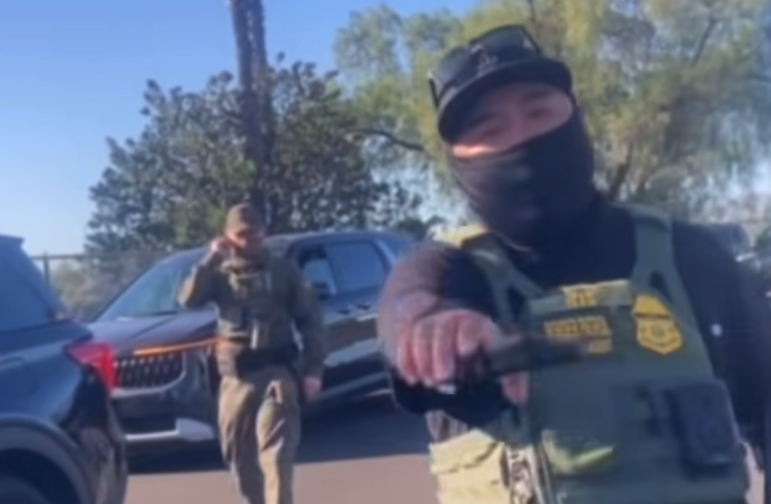[dropcap size=big]T[/dropcap]he normally quiet suburbs east of downtown LA are not your usual landmarks for activism. But cities in the San Gabriel Valley such as Alhambra, Diamond Bar, Walnut, West Covina, and more have joined the national wave of protests sparked by the murder of George Floyd.
At least 200 residents from the Rowland Heights area marched in the streets as part of the memorial “Flowers for Floyd.” last week. It was just one of dozens of protests taking place across L.A. that day.
Protesters wielded cardboard signs and flowers as they marched two miles from Gloria Heer Park to Schabarum Park. Cries for justice and “no racist police” rang on Colima, the main thoroughfare that runs through Rowland Heights and its neighboring cities. As the crowd made its trek, drivers honked their horns in support and some pumped their fists out of their car windows. Restaurant workers and residents trickled out to witness the rare sight as well.
Demonstrators chanted “Black Lives Matter” and the names of Floyd and Breonna Taylor, a 26-year-old African American EMT from Louisville, Kentucky, who was killed in her own home by police in March.
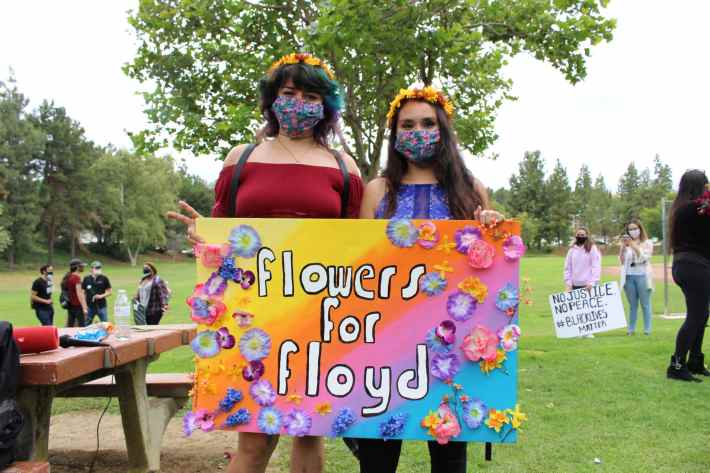
“Flowers for Floyd” was organized by 24-year-old West Covina resident Daisy Rodriguez and her friend Marisa Levy, a 22-year old resident from Walnut. After being greeted by rubber bullets and police aggression at a protest in L.A. last week, they wanted to organize something “predominantly peaceful.”
“A lot of people were afraid to go to the protests out in L.A. because of the way they turned out,” says Rodriguez. But she also says she doesn’t want to discredit people’s anger. “I don’t want to take away from the things that are happening in LA [...] I just wanted to bring it somewhere closer to home.”
“As hard as it is to dismantle your families,’ your friends’ ignorance, we all have to take part in doing it. It’s not the responsibility of the African American community to educate us...”
Though larger gatherings are centralized in downtowns and major cities smaller protests have begun popping up in lesser-known towns all over the U.S. Some see this as a widespread desire for change in a system that has long oppressed black and brown people. In the U.S., Black Americans are 2.5 times as likely as white Americans to be shot and killed by police officers. Statistics also show that, compared to other wealthy countries, police in the U.S. kill civilians at a much higher rate.
Rodriguez and Levy hoped that bringing the movement to Rowland Heights would mobilize people who usually wouldn’t attend a protest.
“If we bring it down the street from somebody’s house, they can’t ignore it anymore,” Rodriguez said.
For those who normally can’t make their way to L.A., Hollywood, or Long Beach, this local protest was a way to show solidarity. For long-time La Puente resident Sandra Herring, seeing this solidarity meant a lot.
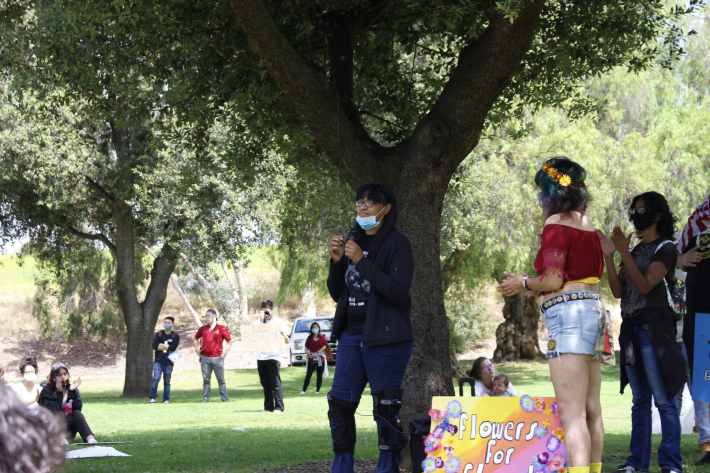
“I’ve just been so moved and impressed by all the millennials and all the nationalities coming together. That means we’ve made progress,” Herring said. Though she couldn’t attend other protests because of her asthma and leg pain, she made it to this one.
The turnout for “Flowers for Floyd” roughly reflected the area’s demographics, which is predominantly Asian, Hispanic, and Latinx, followed by White. Black residents make up about one to two percent of the surrounding neighborhood.
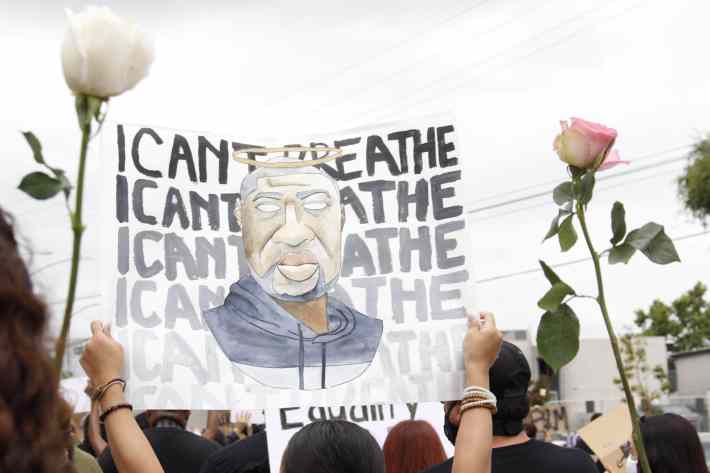
Cassandra Hsiao, a college senior, and her brother Jeremy, a high school graduate, showed their support with signs that read “Asians for Black Lives” and “Silence Supports Violence.”
“I think it’s really important that different races come out to support the Black Lives Matter movement,” said the older Hsiao. “Showing up and standing up in this very physical, tangible way, it’s just the very beginning.”
The younger Hsiao mentioned how African Americans led the civil rights movement in the 50s and 60s, and that other minorities had benefited from the resulting changes.
“It’s important that we give back and that we stand up for all the lives that have been affected and lost,” he said.
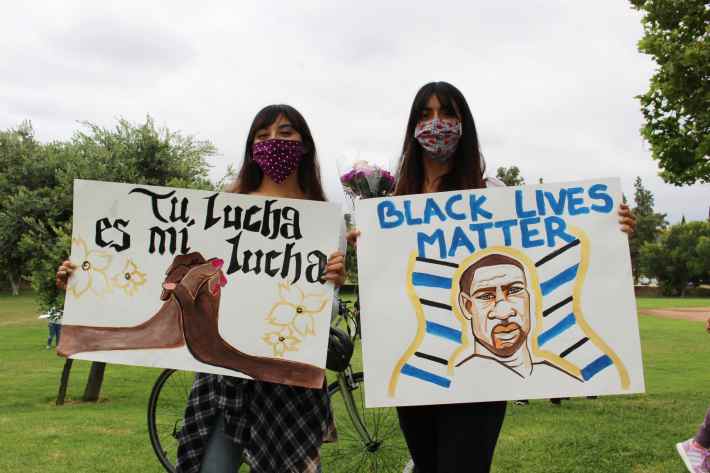
Several signs were written in Spanish as well. Among them were “Tu lucha es mi lucha,” and “Las vidas negras importan,” which translate to “Your fight is my fight” and “Black Lives Matter.”
Much of the conversation among non-Black minorities has centered on confronting the anti-Blackness that exists within their respective communities. One of the protesters, Diana Cruz Cisneros, urged people to take action.
“As hard as it is to dismantle your families,’ your friends’ ignorance, we all have to take part in doing it. It’s not the responsibility of the African American community to educate us,” she said to the crowd of demonstrators.
The march culminated in the grassy fields of Schabarum Park, where protesters placed their flowers on the chalked names of the black people who lost their lives to police brutality and violence. They then gathered around the shade of a large tree to take a knee of silence for the eight minutes and 46 seconds that police officer Derek Chauvin kneeled on Floyd’s neck.
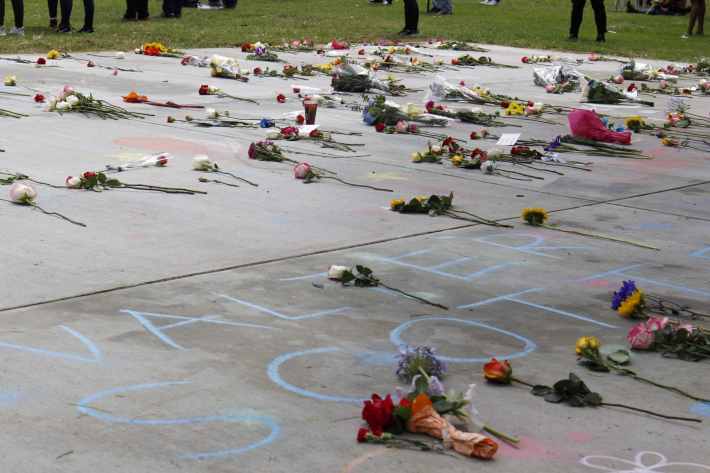
Los Angeles County Supervisor Janice Hahn, Congressman Gil Cisneros, and Senator Bob Archuleta, whose districts cover Rowland Heights and surrounding cities, kicked off a round of speeches by voicing their support for the protest and the Black Lives Matter movement at large.
However, some people in the audience were quick to keep the politicians in check.
“While I appreciate the politicians being here, we also have to hold them accountable because their presence is not enough,” said Whittier resident Paco Quiñones when he took to the mic. “Be the change that we want to see [...] Tell us how you’re going to represent us.”
Andrew Fung Yip, an organizer for the group SGV Progressive Action, called out Archuleta for failing to vote for a bill that makes reforms to California’s incarceration system and for voting against bills that could potentially alleviate affordable housing issues. “It’s not enough to pay lip service,” said Yip.
Though Archuleta did not return requests for comment, his Legislative Aide, Cameron Sutherland, pointed out that the Senator had co-authored a bill in 2019 that regulates the use of deadly force in law enforcement.
Calls for real systemic change compose a large part of the reignited fervor behind Black Lives Matter. Though the movement officially began in 2013, many say that the present moment feels different.
“This is the first time that I’ve ever seen something like this,” said Deborah Collins, who has lived through the Civil Rights protests of the ‘60s and the 1992 Los Angeles Riots. “There are droves of people and they’re elbow to elbow in spite of a pandemic. That speaks volumes,” she said.
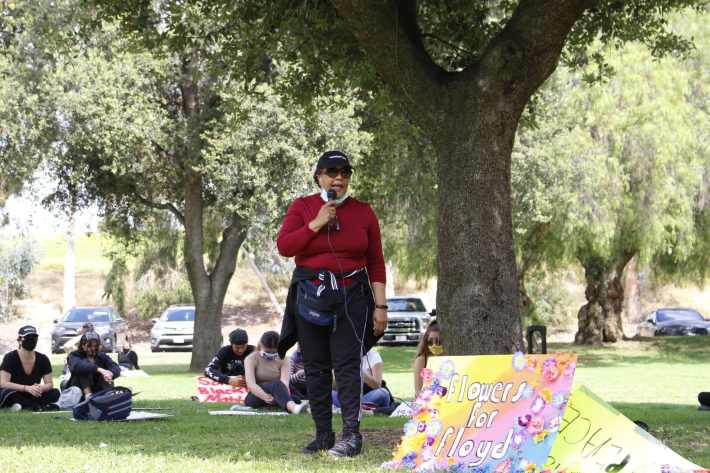
Collins, who is a retired nurse from Rowland Heights, recently returned to work because of the COVID-19 crisis. In her 42-year career, she heard colleagues say blatantly racist things.
“I had nurses that would tell me all day long how they hated helping the Black patients,” she said. “Although it’s a little less overt now, racism still exists. It’s always been there.”
She also recounted how her husband, Jay Collins, worked as one of the few black police supervisors in the Foothill Division during the 1991 Rodney King case. The now-retired officer, reached by phone, said he was asked to work in that division by then-Chief Daryl Gates two weeks after the attack against King.
“They wanted the supervisory staff to resemble and reflect what the community looked like,” said Collins. Though careful about his words, seeing the police brutality that still exists today, Collins believes there are still problems that need to be addressed. “Based on what we saw in 1992 and what we see in 2020, there has to be change,” he said.
In an impassioned speech to demonstrators, Collins emphasized the importance of the individual.
“Each of you has to do what you’re responsible to do and make the change that you’re supposed to make,” she said, “If you don’t do that, then you do us all a disservice.”
For the individual, that responsibility can look like donating, educating themselves and others, and calling on city council members and congress members for policy changes. Several protesters who spoke up, including Collins, urged people to vote in the November 3 general election.
This story was written by a student at USC under the guidance of Amara Aguilar and Laura Castañeda as part of L.A. Taco’s longstanding commitment to being a platform available to first-time writers. Expect more engaging stories from new voices in journalism on a regular basis.
